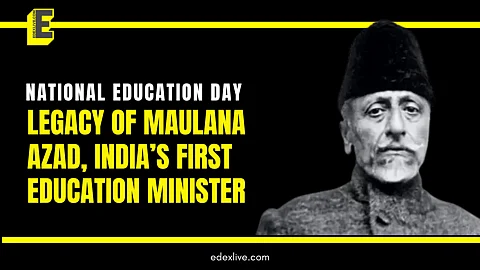

Today, on November 11, India marked National Education Day, a day dedicated to honouring the birth anniversary of Maulana Abul Kalam Azad, the country’s first Minister of Education.
Azad served as the first Education Minister of India from 1947 to 1958 and played a pivotal role in shaping India’s education system post-independence.
Azad’s legacy
National Education Day is observed to honour his significant contributions to shaping India’s modern education system. Let us look at a few key highlights of his legacy.
In 1951, Azad established the first-ever Indian Institute of Technology (IIT) in Kharagpur. He also set up the Central Institute of Education, Delhi which later became the Department of Education of Delhi University.
Azad also co-founded Jamia Millia Islamia University, initially located in Aligarh, Uttar Pradesh. Fourteen years later, he played a pivotal role in relocating the university to its current campus in New Delhi.
In 1953, he set up the University Grant Commission (UGC).
His vision also led to the strengthening of the Indian Institute of Science (IISc), Bangalore, and the establishment of the Faculty of Technology at Delhi University, laying the foundation for higher education in engineering and technology in India.
Azad is also credited with founding several key institutions that have played a crucial role in shaping India’s educational landscape. He established the Indian Council for Cultural Relations (ICCR), the Sahitya Akademi, the Lalit Kala Akademi, the Sangeet Natak Akademi, and the Council of Scientific and Industrial Research (CSIR), all of which continue to promote Indian culture, arts, and scientific research.
About Abul Kalam Azad
Azad was born Abul Kalam Ghulam Muhiyuddin on November 11, 1888 in Mecca, Saudi Arabia.
Before a freedom fighter and an educationist, he was also a journalist. In 1912, Azad published Al-Hilal, a Calcutta-based Urdu newspaper that was subsequently banned by the British.
